Fourth International Conference on Sustainable Devlopment and Planning
Cyprus
Overview
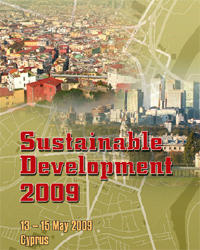 The fourth International Conference on Sustainable Development and Planning took place recently in Cyprus organised by the Wessex Institute of Technology, the University of Cyprus and the University of Thessaly in Greece. The conference builds upon the series of meetings that began in 2003 in Skiathos, Greece and evolved into conferences in Bologna, Italy (2005) and the Algarve, Portugal (2007).
The fourth International Conference on Sustainable Development and Planning took place recently in Cyprus organised by the Wessex Institute of Technology, the University of Cyprus and the University of Thessaly in Greece. The conference builds upon the series of meetings that began in 2003 in Skiathos, Greece and evolved into conferences in Bologna, Italy (2005) and the Algarve, Portugal (2007).Cyprus is a relatively recently EU ascended country facing many challenges and opportunities for sustainable development and planning as a Mediterranean island, with associated peculiarities in climate and environment as well as on the development and planning levels.
Sustainable Development Planning IV brought together researchers and other stakeholders from across the globe to discuss the latest scientific advances in our understanding of sustainable development, as well as to seek and highlight developments in managerial strategies and assessment tools for policy and decision makers on the planning level.
Opening Ceremony
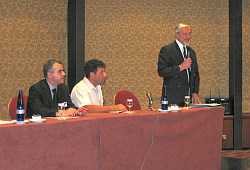 The Conference was chaired by Professor Carlos A Brebbia from the Wessex Institute of Technology, UK; Professor Marina Neophytou and Professor Ioannis Ioannou, from the University of Cyprus; and Professor Elias Beriatos from the University of Thessaly in Greece. Mr Charalambos Theopemptou, Commissioner for the Environment of Cyprus, added prestige to the meeting by participating in the opening ceremony.
The Conference was chaired by Professor Carlos A Brebbia from the Wessex Institute of Technology, UK; Professor Marina Neophytou and Professor Ioannis Ioannou, from the University of Cyprus; and Professor Elias Beriatos from the University of Thessaly in Greece. Mr Charalambos Theopemptou, Commissioner for the Environment of Cyprus, added prestige to the meeting by participating in the opening ceremony.Professor Brebbia opened the meeting by explaining the importance of this conference within the knowledge dissemination programme of the Wessex Institute of Technology (WIT), whose main function is to act as a bridge between academia, industry and society as a whole. WIT achieves this by participating in a substantial number of research programmes held in association with major institutions around the world. These programmes, which are supported by organisations as varied as Research Councils, the EU, NATO and different foundations, bring many partners together. Within this scheme, WIT participates as a provider of expertise in computer modelling; including those based on the Boundary Element Method (BEM). The technique, which was developed at WIT over the last quarter of a century, has contributed to the international reputation of the Institute and is now widely accepted by industry.
Professor Brebbia also pointed out the continuous evolution of the WIT Press publications, the publishers of the conference book. Now not only are these books produced and distributed in hard cover format all over the world but they are also offered as eBooks through a series of major distributors. As usual, all papers are also permanently stored in the WIT eLibrary (http://library.witpress.com) where they are permanently available to the international community. This gives WIT Press books, including the proceedings of Sustainable Development and Planning IV the widest possible diffusion.
Professor Elias Beriatos, from the University of Thessaly, and now also an MP at the National Parliament in Athens, spoke about the collaboration of his University with this series of WIT conferences. Professor Elias Beriatos was instrumental in the setting up of the Department of Development and Planning at the University of Thessaly. A highlight of these links between WIT and the University of Thessaly was the ceremony to award the Prigogine Medal to Professor Ioannis Antoniou from the University of Thessaly. The Prigogine Medal was established in 2004 by the University of Siena and the Wessex Institute of Technology to honour the memory of Ilya Prigogine, Nobel Prize Winner for Chemistry. Prigogine’s idea established the basis for ecological systems research. The Prigogine Medal to honour his memory is awarded annually to a leading scientist in the field of ecological systems. Ioannis Antoniou is Professor of Analysis and Statistics and Head of the School of Mathematics at the Aristotle University of Thessaly in Greece. Professor Antoniou’s work was carried out at the International Solvay Institute of Physics and Chemistry from 1982 until the passing away of Ilya Prigogine in 2003. Inspired by the work of Prigogine, Professor Antoniou is now involved in the statistical analysis of complex networks related to biomedical problems and the internet, as well as in mathematical problems of complexity. The island of Skiathos, where the ceremony took place, is located very near the site of the University of Thessaly in Volos.
Professor Marina Neophytou and Professor Ioannis Ioannou described the facilities at the University and how this institution has developed since its creation 20 or so years ago. They also welcomed the delegates to the conference in the name of their institutions.
Professor Brebbia then introduced Mr Charalambos Theopemptou, the Commissioner (or Minister) for the Environment in Cyprus. Mr Theopemptou, who is an Electronics Engineer by training, answers directly to the President. During his address, he spoke as follows:
“Water stress, waste management, energy, lack of transport and the impact of tourism on this island formulate the biggest environmental issues that we face.
“Sustainability and planning require knowledge and care from people in the decision making process and the directions and restraints that only legislation can impose. During the preparatory years leading to EU accession, a great number of EU directive based laws and regulations went through parliament, out of which approximately 60% were environment related.
“One of these is the Environmental Impact Assessment Law on either strategies or particular projects. This was seen by the environmental groups as an important sustainability tool. Unfortunately, the EU Directive is not tight enough and has a number of loopholes for those that seek to find them. Three big issues are:
- The minimum content and structure of an Environmental Impact Assessment (EIA) study
- Who and with what expertise can actually take part in a study
- And whether the conclusions and recommendations of the study are implemented once the permit is issued
“The main difficulties lie with other more important and unsolvable problems. A lot of these problems have their roots in the political past of the island.
Strong central government control
“This sometimes makes it very difficult to implement EU directives, with the main issue being the tight grip that central government has on:
- All forms of public transport. Routes, fares and even bus stop placement are centrally controlled. There is now an effort for the various municipalities to take on some of this control but I feel that perhaps now it is too late.
- Control over town planning and zoning. The way the city expands, is that once an area is zoned as residential area, the land owners will design and build the streets and once this is approved the building process begins. In a process like this, government has no control on issues like where a school will be built, which areas will be commercial and which purely residential. Decisions are taken later on as the need arises. It might be easy to find a place to build a school but it is impossible to plan for a part in the city.
- Budget on road design and construction. Government has control over major roads which are often upgraded to serve areas. Upgrading two lane roads to four lanes is not an easy task within a city and usually green spaces are the first to go.
- Municipal waste. This is collected by the local authorities but the budget for reception facilities and landfills is controlled by government. There is no legal obligation for citizens to recycle and hopefully this will soon change.
- Energy matters. These are again centrally regulated.
Municipalities
“Municipal councils usually take decisions based on what they see as short term benefits and it’s often that one can sense the absence of the necessary training on sustainability and other environmental issues.
“A good example of this is the decision to place all the operations of the new Technical University in the heart of the city of Limassol.
“With a final target of around 7000 students, no public transport, no parking spaces, no suitable buildings, no student accommodation and a lot of other problems coming, the decision was taken without a public consultation process and without preparing an EIA. The University is now making a huge and costly effort to set up its facilities that will of course be spread within the city.
“The whole of the Mediterranean region is poised to suffer most from climate change with higher temperatures and lower rainfall being the main concerns. The change is already visible throughout the island.
“The water issue is a classic case of non sustainable design and use. We run out of water because:
- The public never understood how serious the situation was as there were no campaigns to save water
- We allocated water for agricultural use on a political criterion rather than with common sense.
- We don’t manage properly the water that we have. We have leaky pipes, no building regulations with regard to water and there are estimated to be around 300,000 illegal boreholes that have caused serious damage to the aquifer.
Professor Brebbia thanked Mr Theopemptou for his interesting and informative talk and declared the conference open.
Conference Sessions
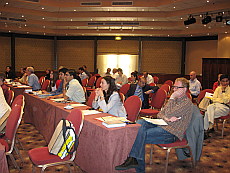 The conference comprised the following series of sessions:
The conference comprised the following series of sessions:- City planning
- Regional planning
- Social and political issues
- Rural development
- Cultural heritage
- Transportation
- Safety of users in road evacuation
- Ecosystems analysis, protection and remediation
- Environmental management
- Environmental impact assessment
- Indicators of sustainability
- Sustainable solutions in developing countries
- Sustainable tourism
- Waste management
- Flood-risk management
- Resource management
Special Session: Sustainability and the Built Environment in Cyprus
A special session was organised on Sustainability and the Built Environment for the specific case of Cyprus. It consisted of five papers selected by the local organisers, Marina Neophytou and Ioannis Ioannou:- “ADOBE: an environmentally friendly construction material”
- “Use of crushed fire clay ceramics in the production of mortars”
- “Towards more sustainable and environmentally friendly concretes: the use of silica fume”
- “Ventilation characteristics of the built environment and their effects on the urban microclimate”
- “Classification of buildings in Cyprus based on their energy performance”
Keynote Addresses
The following keynote addresses were delivered during the conference:
- “Towards sustainable spa tourism activities in Greece” by E Beriatos, University of Thessaly, Greece
- “Sustainability regulations in urban planning: the experience of the autonomous community of Valencia (Spain)” by J L Miralles I Garcia, Universidad Politecnica de Valencia, Spain
Special Session: Safety of Users in Road Evacuation
Another important session was organised by Professor Francesco Russo of the University of Reggio Calabria on the topic of “Safety of Users in Road Evacuation: Modelling and DSS”. It consisted of the following papers:- “Safety of users in road evacuation: modelling and DSS for LFA in the planning process”
- “Safety of users in road evacuation: modelling and DSS for demand”
- “Safety of users in road evacuation: modelling and DSS for transport supply and supply-demand interaction”
- “Safety of users in road evacuation: modelling and DSS for paths design of emergency vehicles”
- “Safety of users in road evacuation: modelling and DSS for pedestrian outflow”
Conference Dinner and Visits
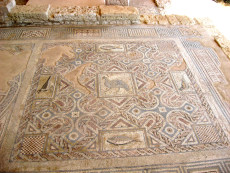 The conference provided ample opportunities for interaction between the delegates during the coffee breaks and social functions. The participants were offered complimentary lunches in order to increase their contact.
The conference provided ample opportunities for interaction between the delegates during the coffee breaks and social functions. The participants were offered complimentary lunches in order to increase their contact.The Conference Dinner took place in a typical taverna in the old city of Limassol. The restaurant is located in a nicely renovated ancient building. The excellent cuisine and good local wines contributed to the success of the social occasion. The University of Cyprus’ folkloric dance group played typical pieces. A few delegates were brave enough to attempt dancing under the tuition of the Cypriot and Greek participants. It was a very friendly occasion to strengthen contacts and get to know each other better.
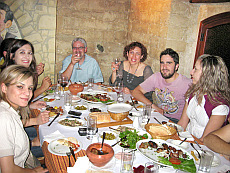 The conference ended with a tour organised by the University of Cyprus and open to all participants. The trip included the Archaeological site of Kourion, an important city kingdom in antiquity and one of the most impressive in Cyprus. They also saw the magnificent Greco-Roman theatre and the “House of Evstolios”, a complex of rooms and baths with beautiful 5th Century A.D. Mosaic Floors. Another interesting sight was the Sanctuary of Apolon Ylatis, an important religious centre from the 8th Century B.C.
The conference ended with a tour organised by the University of Cyprus and open to all participants. The trip included the Archaeological site of Kourion, an important city kingdom in antiquity and one of the most impressive in Cyprus. They also saw the magnificent Greco-Roman theatre and the “House of Evstolios”, a complex of rooms and baths with beautiful 5th Century A.D. Mosaic Floors. Another interesting sight was the Sanctuary of Apolon Ylatis, an important religious centre from the 8th Century B.C.The tour continued to Omodos, one of the most picturesque in Cyprus – a wine producing village in the Trodus hills with narrow cobbled streets and the Monastery of the Holy Cross in the centre of the village. There the participants had the opportunity to taste local wines and the traditional “Commandaria”, a sweet red wine for which the island is renowned.
Next Conference
The success of the conference has ensured that the meeting will be reconvened in 2011, the date and location to be decided shortly.Publication of Papers
 The proceedings of Sustainable Development and Planning IV – Vol 1 and 2, 544pp and 560pp (Print ISBNs: 1-84564-424-6 and 1-84564-422-1; Online ISBNs 978-1-84564-425-3 and 978-1-84564-423-9; Print ISSN 1746-448X) are available from WIT Press priced at £207/US$372/€269 and £213/$383/€277. (Details for the set: Print ISBN 978-1-84564-181-8, Online ISBNs 978-1-84564-358-4, £395/$711/€514) Orders can be placed by telephone: +44 (0) 238 029 3223, fax: +44 (0) 238 029 2853, e-mail:
The proceedings of Sustainable Development and Planning IV – Vol 1 and 2, 544pp and 560pp (Print ISBNs: 1-84564-424-6 and 1-84564-422-1; Online ISBNs 978-1-84564-425-3 and 978-1-84564-423-9; Print ISSN 1746-448X) are available from WIT Press priced at £207/US$372/€269 and £213/$383/€277. (Details for the set: Print ISBN 978-1-84564-181-8, Online ISBNs 978-1-84564-358-4, £395/$711/€514) Orders can be placed by telephone: +44 (0) 238 029 3223, fax: +44 (0) 238 029 2853, e-mail: Papers from the conference will also be hosted online in the WIT eLibrary as Volume 120 of WIT Transactions on Ecology and the Environment (ISSN: 1743-3541). For more details visit the WIT eLibrary at http://library.witpress.com.


 Wessex Institute
Wessex Institute